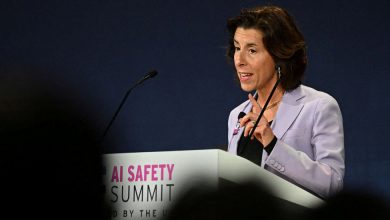Oil Executives Begin Testimony on Industry’s Role in Climate Disinformation

House Democrats have begun questioning the executives of some of the world’s biggest oil and gas companies — ExxonMobil, Chevron, BP and Shell — over allegations that the companies for years spread disinformation about the role played by fossil fuels in global warming in order to slow action on climate change.
“Today, the C.E.O.s of the largest oil companies in the world face a stark choice,” Ro Khanna, the Democratic representative from California who has been central to the effort to bring executives before a congressional committee, is expected to say in prepared remarks seen by The New York Times.
“You can either come clean, admit your past misrepresentations and ongoing inconsistencies, and stop supporting climate disinformation. Or you can sit here in front of the American public and lie under oath.”
Industry executives are expected to defend their evolving statements regarding climate science, and stress that they support global action on climate, including the Paris accord — the agreement among nations to work together to limit climate change — and that the oil and gas industry will play a critical role in solving the climate crisis.
“Inaction is not an option,” Suzanne Clark, president of the U.S. Chamber of Commerce is expected to say, according to prepared remarks.
The hearings mark the first time oil executives will be pressed to answer questions, under oath, about whether their companies misled the public about the reality of climate change by obscuring the scientific consensus: that the burning of fossil fuels is raising Earth’s temperature and sea levels with devastating consequences worldwide, including intensifying storms, worsening drought and deadlier wildfires.
House Democrats compare the inquiry with the tobacco hearings of the 1990s, which brought into sharp relief how tobacco companies had lied about the health dangers of smoking, paving the way for tougher nicotine regulations. Climate scientists are now as certain that the burning of fossil fuels causes global warming as public health experts are sure that smoking tobacco causes cancer.
Here are some expected points of contention:
What have oil companies said over the years about climate change, and the need for climate action?
In a statement released ahead of the hearing, Exxon said that its statements about climate science have been “truthful, fact-based, transparent and consistent with the broader mainstream scientific community at the time” and “evolved” as the science did.
Academics disagreed sharply with the statement on Wednesday. “I study the history of climate science; this is flat out false,” Naomi Oreskes, whose work has focused on the tobacco and fossil fuel industries, wrote on Twitter in response to the Exxon statement.
In recent research, Dr. Oreskes and Geoffrey Supran, a research fellow at Harvard, examined ExxonMobil documents related to climate to catalog how the company downplayed the reality and seriousness of climate change to try to shift responsibility for climate change away from itself and onto consumers.
As recently as 2000, Exxon Mobil advertised in The New York Times that “scientists have been unable to confirm” that the burning of oil, gas and coal caused climate change. However, a decade before that, scientists had confirmed that the planet had warmed by 0.5 degrees Celsius over the previous century because of fossil fuel-driven greenhouse gases.
At Thursday’s hearing, the president of BP America, David Lawler, is expected to respond to criticisms like these by pointing to a 1997 speech at Stanford University by John Browne, then chief executive of BP. In the speech, he said that there “is now an effective consensus among the world’s leading scientists that there is a discernible human influence on the climate” and said that “it would be unwise and potentially dangerous to ignore the mounting concern.”
Does the industry support climate policy now?
Most oil and gas industry players have publicly supported the Paris climate agreement.
“We have always believed the U.S. must take a strong leadership role in the Paris talks to facilitate meaningful global progress and to maintain and enhance the competitiveness of U.S. business in a global market,” Ms. Clark is expected to say, according to her prepared remarks.
In the past, the Chamber criticized the Paris pledges developed by the Obama administration, pointing to a potential economic fallout.
The American Petroleum Institute, an industry group which the four companies in Thursday’s House testimony are members of, spent almost half a million dollars to run ads opposing Democratic members of Congress for their support of’ climate bills, according to advertising data analyzed by InfluenceMap, a London-based think tank that tracks corporate influence on policymaking. Those ads, which include at least 286 that targeted individual members of Congress for their support of climate policies, have been viewed at least 21 million times.
What are the companies doing on the climate front?
On top of their support for the Paris accord, BP and Shell have also made “net zero” commitments — eliminating as much carbon pollution as they put into the atmosphere — for their operations. Companies have also made commitments to reduce the amount of methane, a particularly potent greenhouse gas that they release into the atmosphere from oil and gas drilling.
However, clean energy investments by the oil and gas industry accounted for only around 1 percent of total capital expenditure last year, according to the International Energy Agency.
“The world will continue to need oil and gas for the foreseeable future, and it’s important to have American companies as part of that supply mix,” Michael K. Wirth, chief executive of Chevron, is expected to say according to his prepared remarks.
Some companies have started to make commitments to reduce their production.
“By 2030, we expect to reduce our global oil and gas production by 40 percent, relative to 2019. That is on a scale that no other major energy company is planning to do right now,” BP’s Mr. Lawler will say, according to prepared remarks. BP also points to its growing wind power business, including offshore wind projects off the coasts of New York and Massachusetts.
But overall, future mining and drilling plans around the world would produce more than twice as much oil, gas and coal through 2030 as would be needed if governments want to limit warming to 1.5 degrees Celsius (2.7 degrees Fahrenheit) above preindustrial levels, a United Nations-backed report said earlier this month.
Scientists and world leaders increasingly say that holding global warming to 1.5 degrees Celsius is crucial if humanity wants to avoid the most catastrophic consequences of climate change, such as ever-deadlier heat waves, large scale flooding and widespread extinctions.



